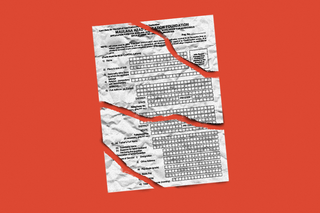
Govt Discontinues National Fellowship for Minority Students
The move comes days after the government’s decision to restrict the scope of a pre-matric scholarship for minority students.

On Friday, the Union Minister of Minority Affairs, Smriti Irani, announced in Parliament the government’s decision to discontinue the Maulana Azad National Fellowship. The fellowship provides financial assistance to M.Phil and Ph.D. scholars from economically weaker minority families. Students from six notified minority communities — Muslim, Sikh, Christian, Buddhist, Jain, and Parsi — are covered by the fellowship. The announcement comes just weeks after the Centre’s decision to restrict the scope of an existing pre-matric scholarship for minority students. Together, these decisions stand to widen educational inequalities that minority students face in the country.
A statement by the Ambedkar Students Association, University of Hyderabad noted, “This fellowship, which remained the only financial lifeline for Buddhist, Christian, Jain, Muslim, Sikh and Parsi students who are already grossly under-represented in India’s public universities, has been scrapped for citing overlaps with other fellowships. The reason… fails to recognise the multiple axes of disadvantages that students face.”
On 30th November this year, The Wire reported on the union government’s decision to modify the scope of the Pre-Matric Scholarship Scheme of the Ministry of Minority Affairs, making only students in classes IX and X eligible for the scheme. Earlier, it was eligible for students from classes I to X. Together, they represent a blow to minority students’ education at both the higher-secondary, and higher education levels.
Both the Maulana Azad National Fellowship, as well as the Pre-Matric Scholarship Scheme of the Ministry of Minority Affairs, were schemes that were introduced by the government following the report of the Sachar Committee. Headed by Rajinder Sachar, a former Chief Justice of the Delhi High Court, the seven-member Committee was established by the union government in 2005 to look into the social, economic, and educational conditions of Muslims in India.
The Committee in its report highlighted the grave inequalities that Muslims in India faced, emphasising their deplorable economic conditions, and their low numbers in education and public employment. It highlighted how Muslims remained underrepresented in all public spheres, and how settlements with significant Muslim populations remained underdeveloped and devoid of even basic amenities like electricity and primary healthcare facilities. The Committee also recommended the then government to set up schemes that would reduce the wide education and economic gap that existed between Muslims and upper-caste Hindus, following which the government introduced the now-discontinued schemes for primary and higher education.
Available data reveals that within a few years of the institution of the Pre-Matric Scholarship Scheme, more than 50 lakh students availed of it. Half of these students were girls, who are often left especially disadvantaged from pursuing their education in situations of financial trouble. The Maulana Azad National Fellowship also enabled a significant number of research aspirants to pursue higher studies. Between 2014 and 2022, the scheme benefitted close to 7,000 individuals. Discontinuing the fellowship, then, will drive many research aspirants from minority communities away from pursuing higher education.
Related on The Swaddle:
How Community Education Collectives Are Challenging Existing and Increasing Educational Inequality
The government’s rationale for modifying the Pre-Matric Scholarship was that they wanted to bring the scheme at par with a similar scheme funded by the Ministry of Social Justice and Empowerment and the Ministry of Tribal Affairs for Scheduled Caste (SC) and Scheduled Tribe (ST) students. Education for classes I to VIII, the government further explained, would be covered under the provisions of the Right of Children to Free and Compulsory Education Act, 2009 (RTE).
Activists and opposition politicians pointed out, however, that the move would leave minority students severely disadvantaged. “The RTE Act is not implemented by the government in its true spirit as government schools are running without basic infrastructure. The 25% free seats in private schools for the poor is also not implemented in many States. At this juncture withdrawal of scholarships can lead to mass dropout of the students studying in private schools,” SQ Maqsood, an education activist based in Hyderabad, told The Hindu. A lot of students would thus be left out of any sustainable financial support to continue their education. In the Tamil Nadu alone, for instance, close to 5 lakh students belonging to economically disadvantaged minority families would be left out of the purview of this scheme, discouraging them from ever thinking of finishing their education.
Similarly, the discontinuation of the Maulana Azad National Fellowship will leave out a considerable amount of research scholars and aspirants belonging to economically disadvantaged minority families. Scholars covered by this scheme were already facing some distress when the announcement came in. In July this year, The Hindu reported of the payments under the scholarship being delayed by more than nine months.
These scholarships were a step toward bridging the socio-economic gap that minority students face, enabling lakhs of students from disadvantaged minority families a shot at equality through education. Discontinuing these scholarships now, without adequate replacements, will drive back even the students who managed to get educated, undermining the equalizing aspects of education.
Amlan Sarkar is a staff writer at TheSwaddle. He writes about the intersection between pop culture and politics. You can reach him on Instagram @amlansarkr.
Related


UN Grants Consultative Status to Dalit Rights Group After 15 Years
